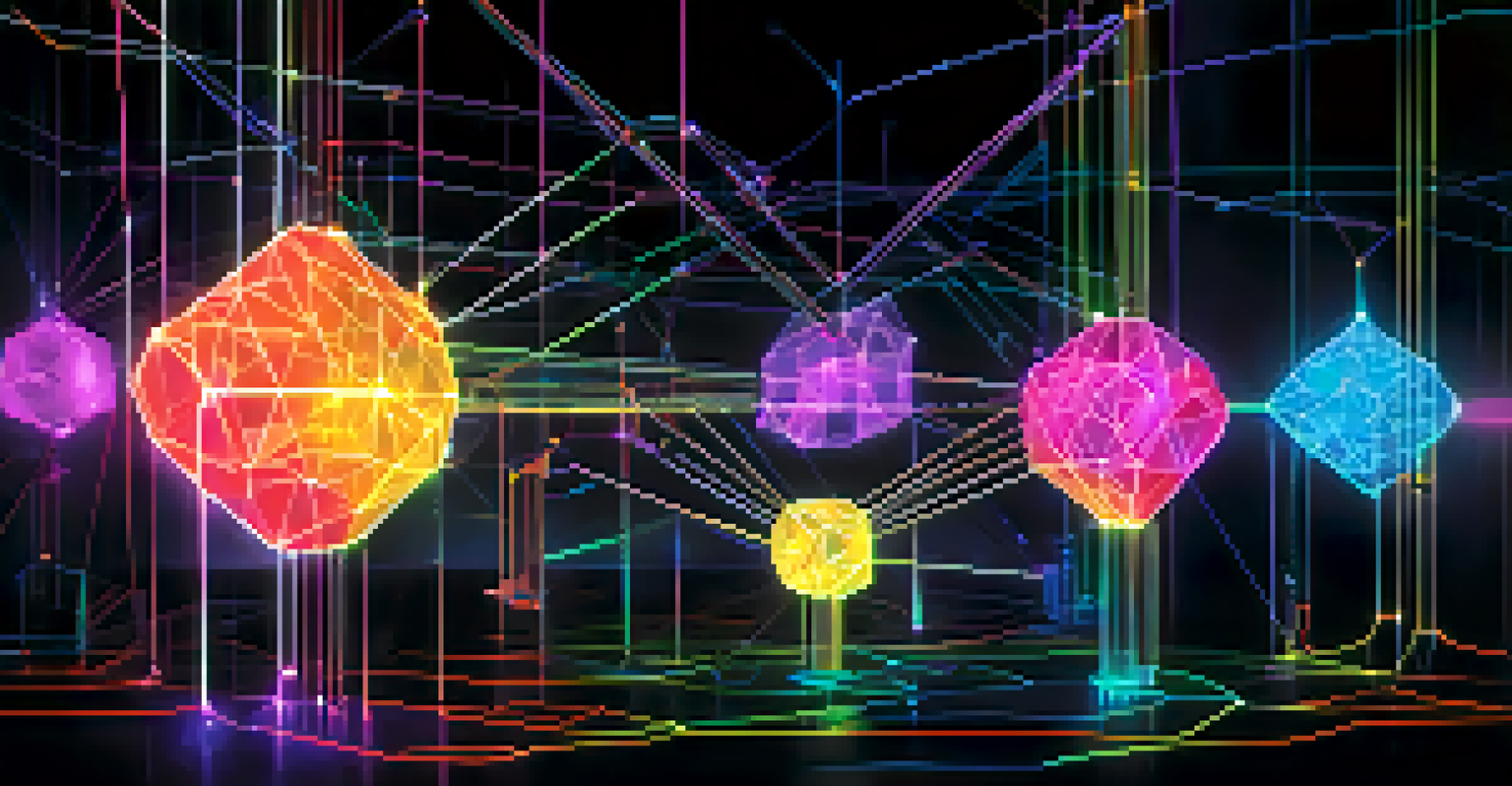The Role of DAOs in Decentralized Decision-Making Processes

What Are DAOs and Their Purpose in Decision-Making?
Decentralized Autonomous Organizations, or DAOs, are digital entities governed by smart contracts on a blockchain. Unlike traditional organizations, they operate without a central authority, allowing members to make decisions collectively. This structure enables a more democratic approach, where every participant has a voice, thus enhancing transparency and accountability.
DAOs represent a fundamental shift in how we think about governance and decision-making, empowering individuals to take control of their collective future.
The primary purpose of DAOs is to empower communities by giving them control over decisions that affect them. For instance, in a DAO focused on funding open-source projects, members can propose and vote on which projects to support. By leveraging blockchain technology, DAOs ensure that all decisions are recorded and transparent, fostering trust among participants.
As DAOs gain popularity, they challenge conventional business models, encouraging a shift toward more inclusive governance. This evolution not only benefits the members but also creates a more resilient ecosystem where diverse ideas can flourish and be funded.
Key Features of DAOs That Enhance Decision-Making
DAOs are characterized by specific features that significantly enhance decision-making processes. Firstly, they are built on blockchain technology, which ensures that all transactions and decisions are immutable and transparent. This level of transparency allows members to trust the process, knowing their contributions and votes are securely recorded.

Another key feature is the use of governance tokens, which grant voting power to members based on their stake in the organization. This system aligns incentives, as members are more likely to engage actively in the decision-making process when they have a tangible stake in the outcomes. For example, a member with a larger number of tokens can propose initiatives that reflect their interests.
DAOs Enable Collective Decision-Making
Decentralized Autonomous Organizations allow members to make decisions collectively, enhancing transparency and accountability.
Finally, DAOs often incorporate mechanisms for proposal submissions and voting, making it easy for members to participate. This streamlined process encourages grassroots involvement, ensuring that even the quietest voices can influence the direction of the organization.
The Benefits of Decentralized Decision-Making
Decentralized decision-making through DAOs offers numerous benefits, the most significant being enhanced inclusivity. By allowing every member to weigh in on proposals, DAOs break down hierarchical barriers typical in traditional organizations. This empowers individuals who might otherwise feel overlooked, fostering a sense of community ownership.
Decentralization gives power back to the people, fostering a more inclusive and equitable ecosystem for collaboration and innovation.
Another advantage is the reduction of biases that often plague centralized decision-making. With multiple participants contributing diverse perspectives, DAOs can arrive at more balanced and informed decisions. For instance, a DAO focused on environmental initiatives will benefit from input from various stakeholders, including scientists, activists, and local communities.
Lastly, DAOs can operate more efficiently than traditional organizations by eliminating bureaucratic red tape. Decisions can be made swiftly, allowing organizations to adapt and respond to changes in the environment or community needs more effectively.
Challenges Faced by DAOs in Decision-Making
Despite their many advantages, DAOs face significant challenges in decision-making processes. One major issue is the potential for voter apathy, where only a small percentage of members participate in votes. This can lead to skewed outcomes that do not represent the broader community's interests, undermining the democratic ethos of the organization.
Another challenge is the complexity of governance structures. As DAOs grow, their governance can become convoluted, making it difficult for members to understand how decisions are made. This complexity can discourage participation, as members may feel overwhelmed or unsure of how to engage with the decision-making process.
Increased Inclusivity in Governance
DAOs break down hierarchical barriers, empowering all members to participate in decision-making processes.
Moreover, the legal status of DAOs remains ambiguous in many jurisdictions, which can create challenges in accountability and enforcement. Without clear regulations, members may feel hesitant to fully engage, fearing potential legal repercussions or loss of assets.
Real-World Examples of DAOs in Action
DAOs have emerged in various sectors, demonstrating their potential to transform decision-making. One notable example is MakerDAO, which governs the Maker Protocol, allowing users to create and manage stablecoins. Through a decentralized governance model, MKR token holders can propose and vote on changes to the protocol, ensuring that the community drives its evolution.
Another example is the MolochDAO, which focuses on funding Ethereum projects. Members contribute funds and collectively decide which projects to finance through a voting process. This approach not only enhances transparency but also aligns funding with the community's priorities, showcasing the effectiveness of decentralized decision-making.
These real-world implementations highlight how DAOs can cultivate collaboration and empower communities. As more organizations adopt this model, we can expect to see innovative solutions emerge, driven by the collective intelligence of their members.
The Future of DAOs and Decentralized Decision-Making
The future of DAOs appears promising, as more individuals and organizations recognize the value of decentralized decision-making. As technology advances, we can expect improved governance frameworks and tools that will make participation even easier and more accessible. This could lead to an increase in the number of active DAOs across various sectors.
Moreover, as regulatory clarity around DAOs improves, more participants may feel comfortable engaging in the process. This could enhance the legitimacy of DAOs, attracting traditional businesses and investors who wish to explore the benefits of decentralized governance. The fusion of conventional and decentralized models may create hybrid organizations that capitalize on the strengths of both approaches.
Challenges of DAO Participation
DAOs face issues like voter apathy and complex governance structures that can hinder member engagement and decision-making.
Ultimately, the evolution of DAOs could redefine how we think about governance and collaboration. By fostering an environment where everyone can contribute, DAOs have the potential to create more equitable systems that reflect the values and desires of their communities.
How to Get Involved with DAOs
Getting involved with a DAO is more accessible than ever, thanks to the rise of various platforms and communities. The first step is to identify a DAO that aligns with your interests or values. Whether it’s a project focused on social causes, technology, or art, there's likely a DAO that resonates with your passions.
Once you’ve found a DAO, join their community channels, often found on platforms like Discord or Telegram. Engaging with existing members will help you understand the organization's goals, ongoing discussions, and how you can contribute. Participation can range from attending meetings to voting on proposals, depending on your level of interest.

Finally, consider acquiring governance tokens if applicable, as this will grant you voting rights and a say in the DAO’s direction. Your involvement can help shape the future of the organization, ensuring that it reflects the collective interests of its members.